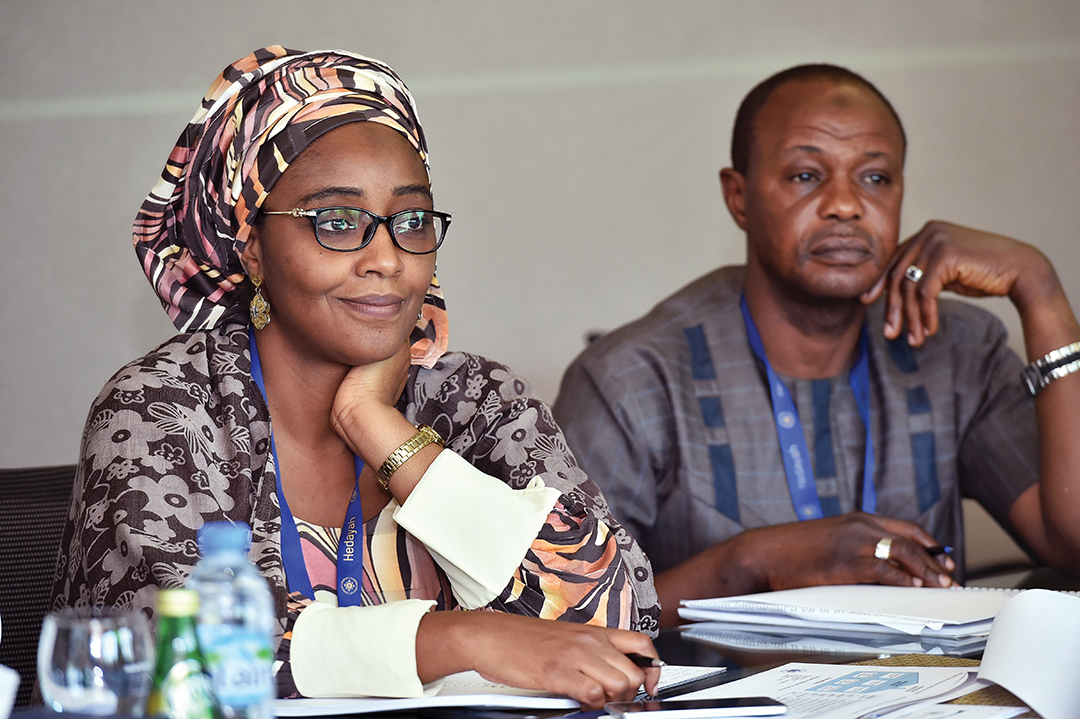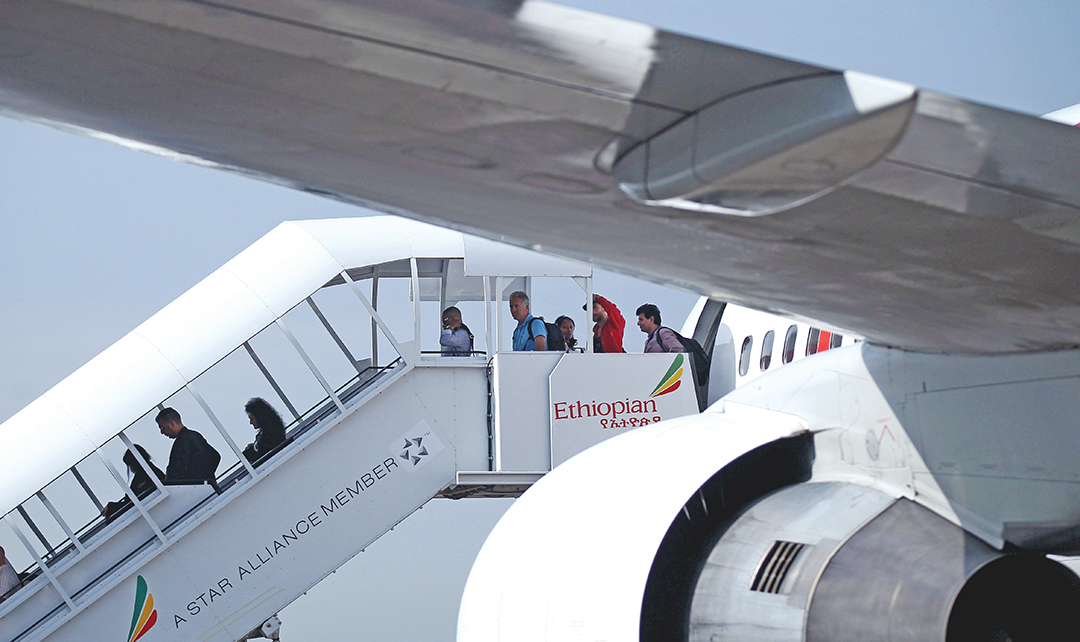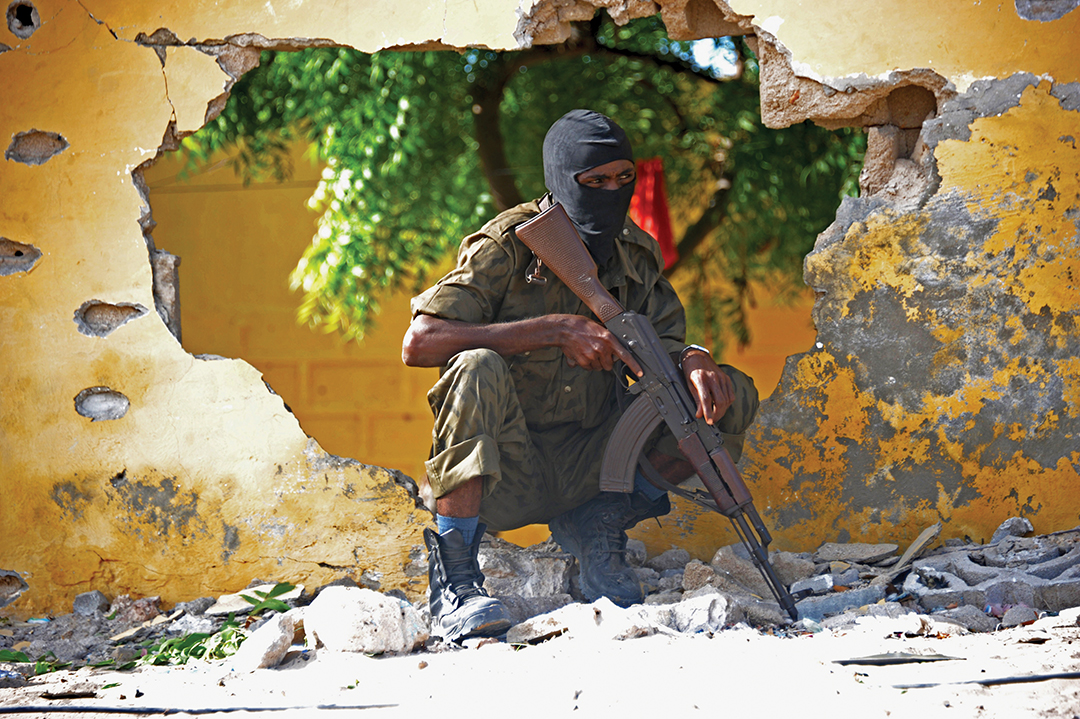East Africa Coalesces Against Extremism
The Region Commits to a Center of Excellence to Help Counter the Terrorist Threat
East Africa often is touted for its economic growth and infrastructure development. Ethiopia had the fastest-growing economy in the world in 2015, according to the World Bank. A new railroad has been built between Djibouti and Addis Ababa. To the south, Kenya has welcomed a steady flow of tourists eager to go on safari and visit its beaches.
However, two major al-Shabaab terrorist attacks since 2013 have dealt a major blow to Kenya’s robust tourism industry. The number of visitors dropped 25 percent in the first five months of 2015, according to a Reuters report. Visitor numbers had fallen 4.3 percent a year earlier. The two-year slump has caused hotels to close, people to lose jobs and the nation’s currency, the shilling, to slide in value.

AFP/GETTY IMAGES
Somali-based al-Shabaab militants also have launched attacks in Uganda, and the threat appears to be spreading: In October 2015, South Sudanese officials announced the arrest of 76 suspected members of al-Shabaab, the first arrest of its kind in the young and troubled nation. “South Sudan is home to many armed groups that are involved in a lot of criminal activity, brutality and violence, but the possible presence of al-Shabaab active cells in the country could pose a new threat to the already vulnerable security state in the country,” according to Strategic Intelligence News. “The current delicate security climate is [a] favorable element likely to be exploited by the militants to build cells.”
Reuters reported that Henry Rotich, Kenya’s finance minister, explained in his 2015-16 budget speech that tackling insecurity is the “top priority of the government’s strategy to sustain the growth momentum of the economy while creating jobs and reducing poverty.”
Now, that commitment to countering violent extremism (CVE) is showing signs of moving beyond the borders of individual countries toward more structured regional cooperation. The Intergovernmental Authority on Development (IGAD) is working with other partners to get the greater Horn of Africa to cooperate more formally in addressing the problem.
CVE COOPERATION TAKES SHAPE IN EAST AFRICA
The White House Summit on Countering Violent Extremism in February 2015 and a subsequent regional conference on CVE in Nairobi, Kenya, in June 2015 laid the groundwork for conversations that continued throughout the year.
IGAD officials convened meetings in Nairobi and Djibouti in August 2015 that brought together diplomatic, government and nongovernmental organizations to talk about ways to institutionalize CVE efforts in the region. The IGAD Security Sector Program (ISSP) is working with the Global Center on Cooperative Security to address CVE in the member states of Djibouti, Eritrea, Ethiopia, Kenya, Somalia, South Sudan, Sudan and Uganda.
“Over the last decade, a consensus has grown among governments, experts, and civil society actors that efforts to counter terrorism without acknowledging and addressing the drivers of violent extremism are likely to be counterproductive, and could increase political marginalization of communities and make vulnerable segments of those communities (such as un- or under-employed youth) susceptible to the allure of violent ideologies,” says a Global Center project description.

ALBANY ASSOCIATES
The idea is to focus on comprehensive strategies that put more emphasis on addressing extremism on the front end. The region has been dealing with CVE for quite some time, but since the White House summit, “there is sort of a reinvigorated effort across the region to get more focused on the preventative side of the coin,” said Eelco Kessels, London office director and senior analyst for the Global Center. Historically, he said, the fight against violent extremism has been rooted in police and military responses.
“There is a growing understanding that this is a problem that you cannot fight your way out of,” Kessels told ADF. “We need to be ahead of the issue and focusing more and more on prevention, which by its very nature includes an involvement of a far broader spectrum of actors beyond the traditional security actors.”
EUROPE PROVIDES A MODEL FOR AFRICA
Terrorism and extremist activity are in no way unique to Africa. European Union (EU) nations dealt with 1,010 “failed, foiled or completed attacks” that resulted in 38 deaths between 2009 and 2013 alone, according to the EU. In 2005, the EU adopted its Counter-Terrorism Strategy, which is built on four pillars: prevent, protect, pursue and respond.
Stemming from the “prevent” pillar is the Radicalisation Awareness Network (RAN), which the European Commission set up in 2011. The EU recognized that extremists now often work in small cells or as “lone wolves” and not just as part of organized, hierarchical organizations such as al-Qaida. Extremists also are globally connected.
“Consequently, terrorist or violent extremist actions are becoming harder to detect and predict by the authorities, making traditional law enforcement techniques alone insufficient to deal with these evolving trends, particularly in relation to tackling the root causes of the problem,” according to a 2015 RAN report. “There is a need for a broader approach, aimed at earlier intervention and prevention and engaging a wide spectrum of actors throughout society.”
The RAN is a network of practitioners and local groups that work to prevent and counter radicalization. They participate in working groups to exchange experiences, knowledge and practices in different areas of counterradicalization. “Participants include NGOs, representatives of different communities, think tanks, academia, law enforcement agencies, government representatives and consultancies,” according to the RAN.
The RAN brings together practitioners from across Europe to discuss CVE from “an on-the-ground perspective,” Kessels said. It is an informal, changing group that keeps an eye on new developments and shares good practices and approaches in a structure that feeds into the EU at the policy level. The RAN now is becoming more institutionalized and may look at European experiences and how they may apply elsewhere. Although the RAN is built upon a formal cross-border structure that does not exist in East Africa, it can serve as “an interesting model” for the region in that the issues with which it deals, its principles and best practices are the types of things officials would want to address in the greater Horn of Africa, Kessels said.
AN EAST AFRICAN CENTER OF EXCELLENCE
One of the top priorities to come out of regional meetings in Nairobi and Djibouti was the desire to establish a CVE Center of Excellence and Counter Messaging Hub for the IGAD region. Dr. Simon K. Nyambura, a Kenyan who serves as the head of counterterrorism for ISSP, told ADF the center’s goal would be to coordinate the activities of state and nonstate actors in the IGAD region and in greater East Africa.

Up until now, the region has approached CVE in an ad hoc, piecemeal way. That has to change, Nyambura said. “What is lacking is a mechanism that is able to mobilize people, and mobilize the people in the region in a more organized way.”
The center would be a “dedicated venue for expertise and experience in training, dialogue, and research related to CVE under IGAD’s auspices in Djibouti,” according to an outcomes document from the August 2015 meeting in Djibouti. “The governments of Djibouti, Kenya, Ethiopia, Somalia, Tanzania, and Uganda, as well as the African Union are full partners for this center.”
The center will generate and share best practices, and engage stakeholders such as local and national governments, key government partners from outside the region, multilateral bodies, women, youth, the private sector, and religious and other civil society leaders, the document said.
The center would address topics such as how to:
- Empower youth, women, religious leaders and civil society more broadly to counter violent extremism.
- Counter the violent extremist message via social media.
- Generate positive alternatives for young people who are vulnerable to extremist recruiters.
- Improve the way police and military forces engage with local communities.
- Amplify influential religious voices and critical thinking skills.
- Prevent radicalization in prisons.
- Rehabilitate and reintegrate disengaged fighters, including foreign terrorist fighters.
The center also would focus on training and learning to help stakeholders design programs to counter violent extremism; build connectivity by providing a platform for discussion and collaboration; enhance countermessaging by helping local partners develop and disseminate alternative narratives or amplify existing ones; and foster research and innovation to gain a better understanding of local drivers of violent extremism.
Nyambura said the center will be headquartered in Djibouti. Organizers were working on logistics, staffing and funding in late 2015. The plan is to have it up and running before the middle of 2016.
The RAN also is in the process of being transformed into the “RAN Centre of Excellence,” which will be an “institutionalization of an already-existing network,” Kessels said. With its center, the RAN moves from a secretariat that supports a stakeholder network and runs meetings to a new phase in which there will be more emphasis on sharing best practices, training and counseling, including in priority third-party countries.
The center in Djibouti will likely resemble Hedayah, the first international center of excellence for CVE, which was started in 2012 in Abu Dhabi, United Arab Emirates, inspired by the Global Counterterrorism Forum. Hedayah is “devoted to training, dialogue, collaboration, and research to counter violent extremism in all of its forms and manifestations” by bringing together experts from all over the world, according to its website.
The Djibouti center will focus on East Africa and, according to a 2015 White House news release, “provide dedicated support, training, and research related to CVE, and serve as a resource for governments and civil society from across the region.”
Strategic Commitment
Europe has enacted a four-pronged counterterror strategy to stop attacks while respecting human rights.
Prevent
To prevent people from turning to terrorism by tackling the factors or root causes that can lead to radicalization and recruitment, in Europe and internationally
Protect
To protect citizens and infrastructure and reduce our vulnerability to attack, including through improved security of borders, transport and critical infrastructure
Pursue
To pursue and investigate terrorists across our borders and globally; to impede planning, travel, and communications; to disrupt support networks; to cut off funding and access to attack materials; and bring terrorists to justice
Respond
To prepare ourselves in the spirit of solidarity, to manage and minimize the consequences of a terrorist attack, by improving capabilities to deal with: the aftermath; the coordination of the response; and the needs of victims


Comments are closed.